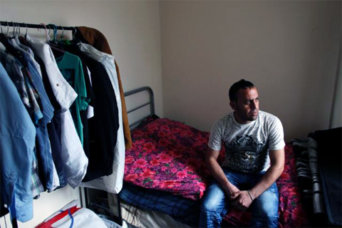- About
- Topics
- Picks
- Audio
- Story
- In-Depth
- Opinion
- News
- Donate
- Signup for our newsletterOur Editors' Best Picks.Send
Read, Debate: Engage.
| topic: | Humans |
|---|---|
| located: | Germany |
| editor: | Gurmeet Singh |
Germany is at a crossroads, especially when it comes to migration. Since the German government's decision to open up European borders to hundreds of thousands of refugees from Syria and North Africa in 2015, the country (along with the rest of Europe) has suffered waves of political unrest, division, indecision and even violence.
It's not difficult to link the success of the Brexit vote in the U.K. and various populist movements across the continent with the decision to allow migrants in. Of course, these political impulses and movements existed long before any such decision, but they were simply charged with new energy after the vote. This said, the decision also breathed new life into pro-refugee and pro-migration movements, while the general public in Europe also seems to have become more aware of the link between climate change and migration.
Germany hasn't known which step to take. On the one hand, it wants to honour commitments to humanity by helping those in need. On the other, it does not wish to let people with black and brown skins, or people with a Muslim background into the country. The former impulse is informed by its historical role as an aggressor in both major world wars, and its role as the State that organised and conducted the Holocaust. The latter is informed by racism and xenophobia, though of course, there are minor strands of intellectual debate against migration which cannot be characterised in any straightforward way as racist – arguments to do with the economy, market stability and so on.
This deep ambivalence (this deep divide we might say) in Germany is most pronounced in the way it is treating current migrants. It is training and educating migrants, integrating them, and then deporting them. The New York Times, in a profile piece, writes:
"Four years after he stepped off a train in Munich looking for asylum, Abdoulie Barry speaks German, rents an apartment and holds a full-time job at an outdoor sporting goods manufacturer. He is punctual and conscientious, his boss says, and pays taxes and welfare contributions.
But both he and his employer know that despite their efforts, federal police officers could walk in any day and arrest and deport Mr. Barry, a 37-year-old who made his way from Gambia, because his refugee status has been rejected."
It goes on: "German law is clear: Although asylum seekers can be given the right to work while their application is pending, if a rejection is final, they are required to leave the country."
Deutsche Welle reports: "Among other things, new laws are intended to prevent those required to leave the country from evading deportation. It will also be easier to hold people in immigration detention. A court order is needed for such deprivation of liberty. Until now, there were around 500 immigration detention places across Germany. However, it will now be possible to detain deportees in regular prisons. In order to avoid any clash with EU regulations, immigration detainees will be separated from criminals."
In 2018, over 21,000 asylum applications were rejected, meaning those people were scheduled to leave the country. How many of them fulfilled the hopes of the old model of monoculturalism: integrate, learn the language, pay your taxes, get a job? And how many were still deported?
The truth is, despite us saying that Germany is at a crossroads, Germany really is veering steadily and slowly towards the right. It is giving way to the hard-conservative right, so that the hard-nationalist right cannot win. Not only has it orchestrated deals with Turkey to accept migrants, it is now deporting migrants who have integrated. There will never be enough that these people can do to satisfy the right and stay in Germany. They will be forced to leave. That's why it's more important than ever to support migrants and pro-migrant organisations, wherever you are.

